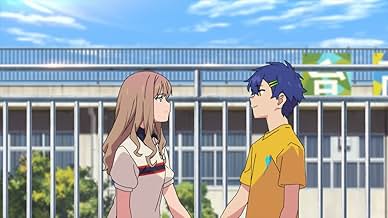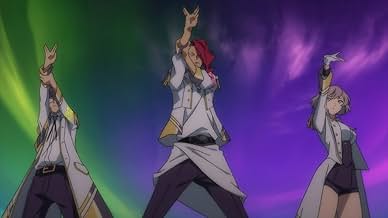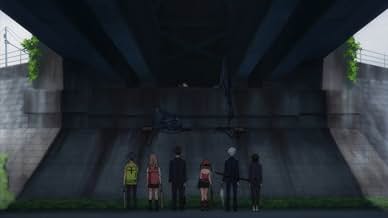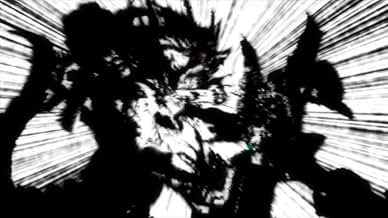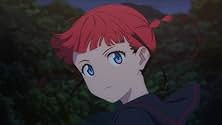अपनी भाषा में प्लॉट जोड़ेंAfter a chance encounter with a self-proclaimed kaiju tamer, a high school student is drawn into a world of fighting mechas and monsters.After a chance encounter with a self-proclaimed kaiju tamer, a high school student is drawn into a world of fighting mechas and monsters.After a chance encounter with a self-proclaimed kaiju tamer, a high school student is drawn into a world of fighting mechas and monsters.
- पुरस्कार
- 4 कुल नामांकन
एपिसोड ब्राउज़ करें
कहानी
क्या आपको पता है
- कनेक्शनEdited into SSSS.Dynazenon (2023)
फीचर्ड रिव्यू
Past regrets, finding a purpose in life, and moving forward. SSSS. Dynazenon effectively conveys a vast range of emotion with masterclass creativity and superb writing. Dynazenon does not strive to emulate the classics. Instead, it confidently crafts its own niche in the mecha genre-inhabiting a space between realism and science fantasy.
Every moment, shot, line of dialogue holds meaning. Though it lacks the constant stunning animation of large-budget anime, it surpasses most with considerate editing, thoughtful framing of each storyboard, expressive character acting and detailed body language, and complex background art. Dynazenon uses every aspect of anime to its advantage, designing a work of art that reveals more information through its visuals than through simple dialogue. Many scenes are cut before the dialogue finishes, abruptly stopping all background sounds. Each cut is purposeful; it gives us a sense of how the characters feel and what meaningful information we must pay attention to. The times Dynazenon is fully animated, it looks as fantastic, if not more, than Trigger's best titles.
Dynazenon has its fair share of formulaic elements repurposed for its benefit. Our four main characters combine pieces of a toy mecha to become Dynazenon-the robot as tall as a skyscraper. The cast aimlessly wanders through their everyday lives until a kaiju appears and gives them a purpose, to fight evil kaiju as Dynazenon! Dramatic tension slowly builds up throughout each episode's quiet and subtle first half, leading into a bombastic last third. Again and again, a kaiju is summoned to wreak havoc on the city. The tonal shift between subtle and over-the-top tokusatsu mecha action is deserved. It's pure cathartic joy.
All five main characters have a vibrant personality and distinct idiosyncrasies that set them apart from the rest. Their lives, fears, and insecurities are vividly detailed through quiet, intimate scenes and backstories. Confronted with their past, they must overcome their relatable insecurities. Notably, all of them feel real. Of course, they're animated, but their personalities are never forced, as so often happens with anime targeted at a young audience. These successes can also be attributed to the impressive VA performances. A few of the VAs are surprisingly industry newcomers-like Minami's actor. She delivers every emotion naturally.
Conversely, Gauma, the supposed kaiju slayer reincarnated 5,000 years ago, talks and acts like a zany anime hero. He speaks with every trait of an energetic kid fascinated with fictional stories. Unlike the others, Gauma works three jobs, doesn't go to school, and lives under a bridge, firmly grounding him in reality. Although at first, his aspiration to be a hero comes off as heavy-handed, through developments, he transforms into a person worthy of admiration. Taking a glance at the poster, you might guess Gauma is the main protagonist, but Yomogi fits that role the most. He is our central perspective. We spend the most time with him. His life is like an open book-unlike everyone else, he's not mysterious or secretive. More importantly, when everyone is given a piece of Dynazenon, he gets the middle part, Dyna-soldier. Yomogi could've quickly fallen into the bland protagonist archetype; luckily enough, he has an intriguing depth surpassing his traditional appearance.
Koyomi and Chise, the last two of the group, leave a slight impression at first, being shuffled to the side in favor of Gauma and Yomogi. Their development comes later, but it's well worth the wait. Both of them are necessary to the success of the team. Chise isn't given a piece of Dynazenon, though she is very much a part of the team. Oftentimes we see the catastrophic battles from her perspective. Connecting with others is a theme they embody. Without a strong connection, they would be unable to pilot Dynazenon together.
Each kaiju has a distinct power that I couldn't possibly spoil because they're so creatively thought up. Certain kaiju powers test the characters' minds, memories, and trauma. If any of them are facing obstacles, whether physically or mentally, it will show in how they fight as Dynazenon. If one of them is off, all of them are. Part of their growth as a team is dealing with individual problems together. Beginning as random strangers, they become a believable found family.
Forever, kaiju have been known as irrationally vicious monsters from films like Godzilla. Similar to how Jaws made me think sharks were man-eating monsters. In truth, they only kill three humans every year. Dynazenon challenges our assumptions of Kaiju. They're innocent creatures, often small and scared until the Kaiju Eugenicists control them with mysterious powers. These four antagonists could be mistaken for ordinary people. They appear to wear futuristic military uniforms, and they treat human life with no care in the world. Despite doing everyday things, like eating at a restaurant or visiting a water park, they're unambiguously cruel. As antagonists, they embody 'banality of evil,' a trait associated with fascists. They have hidden motivations, which are both comprehensible and morally reprehensible. Their fascist ideals directly conflict with the heroes' righteous morals-emotionally charging each of their confrontations. Unfortunately, there was not enough time for the series to adequately delve into each villain.
There are no wordy explanations for powers, kaiju, or robots, no need for exposition. If we receive new information, it is from witnessing it rather than being told it. The sci-fi elements, such as controlling mechas, maintain an internal logic. There are no retcons or forced developments. Director Akira Amemiya found his niche in SSSS. Gridman and refined it, this time embracing a more personal script giving the cast room to explore every emotion. This fact is especially true in the anime's finale-a moving, thought-provoking reveal that will linger in discourse long after the end. Like its predecessor, SSSS. Gridman, this series is brimming with foreshadowing, visual metaphors, and awe-inspiring twists. Is Dynazenon a sequel to Gridman? No. There are a multitude of references, similar themes, and two minor characters who connect both universes. You don't need to watch Gridman first, though it would undoubtedly make you appreciate it more. Both anime are highly recommended.
SSSS. Dynazenon is the work of master artists. It may not have a big budget to attract mainstream attention, what it does have is talent, ambition, and heart. Like all great sci-fi anime, the story it tells is less about giant robots battling and more about the human condition. It successfully told a compelling story with well-rounded characters in a mere 12 episodes. There are few anime more deserving of the label "Underrated" than this fantastic show.
Every moment, shot, line of dialogue holds meaning. Though it lacks the constant stunning animation of large-budget anime, it surpasses most with considerate editing, thoughtful framing of each storyboard, expressive character acting and detailed body language, and complex background art. Dynazenon uses every aspect of anime to its advantage, designing a work of art that reveals more information through its visuals than through simple dialogue. Many scenes are cut before the dialogue finishes, abruptly stopping all background sounds. Each cut is purposeful; it gives us a sense of how the characters feel and what meaningful information we must pay attention to. The times Dynazenon is fully animated, it looks as fantastic, if not more, than Trigger's best titles.
Dynazenon has its fair share of formulaic elements repurposed for its benefit. Our four main characters combine pieces of a toy mecha to become Dynazenon-the robot as tall as a skyscraper. The cast aimlessly wanders through their everyday lives until a kaiju appears and gives them a purpose, to fight evil kaiju as Dynazenon! Dramatic tension slowly builds up throughout each episode's quiet and subtle first half, leading into a bombastic last third. Again and again, a kaiju is summoned to wreak havoc on the city. The tonal shift between subtle and over-the-top tokusatsu mecha action is deserved. It's pure cathartic joy.
All five main characters have a vibrant personality and distinct idiosyncrasies that set them apart from the rest. Their lives, fears, and insecurities are vividly detailed through quiet, intimate scenes and backstories. Confronted with their past, they must overcome their relatable insecurities. Notably, all of them feel real. Of course, they're animated, but their personalities are never forced, as so often happens with anime targeted at a young audience. These successes can also be attributed to the impressive VA performances. A few of the VAs are surprisingly industry newcomers-like Minami's actor. She delivers every emotion naturally.
Conversely, Gauma, the supposed kaiju slayer reincarnated 5,000 years ago, talks and acts like a zany anime hero. He speaks with every trait of an energetic kid fascinated with fictional stories. Unlike the others, Gauma works three jobs, doesn't go to school, and lives under a bridge, firmly grounding him in reality. Although at first, his aspiration to be a hero comes off as heavy-handed, through developments, he transforms into a person worthy of admiration. Taking a glance at the poster, you might guess Gauma is the main protagonist, but Yomogi fits that role the most. He is our central perspective. We spend the most time with him. His life is like an open book-unlike everyone else, he's not mysterious or secretive. More importantly, when everyone is given a piece of Dynazenon, he gets the middle part, Dyna-soldier. Yomogi could've quickly fallen into the bland protagonist archetype; luckily enough, he has an intriguing depth surpassing his traditional appearance.
Koyomi and Chise, the last two of the group, leave a slight impression at first, being shuffled to the side in favor of Gauma and Yomogi. Their development comes later, but it's well worth the wait. Both of them are necessary to the success of the team. Chise isn't given a piece of Dynazenon, though she is very much a part of the team. Oftentimes we see the catastrophic battles from her perspective. Connecting with others is a theme they embody. Without a strong connection, they would be unable to pilot Dynazenon together.
Each kaiju has a distinct power that I couldn't possibly spoil because they're so creatively thought up. Certain kaiju powers test the characters' minds, memories, and trauma. If any of them are facing obstacles, whether physically or mentally, it will show in how they fight as Dynazenon. If one of them is off, all of them are. Part of their growth as a team is dealing with individual problems together. Beginning as random strangers, they become a believable found family.
Forever, kaiju have been known as irrationally vicious monsters from films like Godzilla. Similar to how Jaws made me think sharks were man-eating monsters. In truth, they only kill three humans every year. Dynazenon challenges our assumptions of Kaiju. They're innocent creatures, often small and scared until the Kaiju Eugenicists control them with mysterious powers. These four antagonists could be mistaken for ordinary people. They appear to wear futuristic military uniforms, and they treat human life with no care in the world. Despite doing everyday things, like eating at a restaurant or visiting a water park, they're unambiguously cruel. As antagonists, they embody 'banality of evil,' a trait associated with fascists. They have hidden motivations, which are both comprehensible and morally reprehensible. Their fascist ideals directly conflict with the heroes' righteous morals-emotionally charging each of their confrontations. Unfortunately, there was not enough time for the series to adequately delve into each villain.
There are no wordy explanations for powers, kaiju, or robots, no need for exposition. If we receive new information, it is from witnessing it rather than being told it. The sci-fi elements, such as controlling mechas, maintain an internal logic. There are no retcons or forced developments. Director Akira Amemiya found his niche in SSSS. Gridman and refined it, this time embracing a more personal script giving the cast room to explore every emotion. This fact is especially true in the anime's finale-a moving, thought-provoking reveal that will linger in discourse long after the end. Like its predecessor, SSSS. Gridman, this series is brimming with foreshadowing, visual metaphors, and awe-inspiring twists. Is Dynazenon a sequel to Gridman? No. There are a multitude of references, similar themes, and two minor characters who connect both universes. You don't need to watch Gridman first, though it would undoubtedly make you appreciate it more. Both anime are highly recommended.
SSSS. Dynazenon is the work of master artists. It may not have a big budget to attract mainstream attention, what it does have is talent, ambition, and heart. Like all great sci-fi anime, the story it tells is less about giant robots battling and more about the human condition. It successfully told a compelling story with well-rounded characters in a mere 12 episodes. There are few anime more deserving of the label "Underrated" than this fantastic show.
- RebelPanda
- 1 अग॰ 2022
- परमालिंक
टॉप पसंद
रेटिंग देने के लिए साइन-इन करें और वैयक्तिकृत सुझावों के लिए वॉचलिस्ट करें
- How many seasons does SSSS.Dynazenon have?Alexa द्वारा संचालित
विवरण
- चलने की अवधि24 मिनट
- रंग
- ध्वनि मिश्रण
इस पेज में योगदान दें
किसी बदलाव का सुझाव दें या अनुपलब्ध कॉन्टेंट जोड़ें


